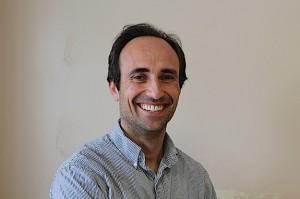Dorsey named Pillar of West Alabama
 “God sent John.”
“God sent John.”
That’s the short answer for how Dr. John Dorsey came to Greensboro, said Michael Lynch, his friend and now managing director and manager of external relations for Project Horseshoe Farms.
In the nine years Dorsey has been in west Alabama, he has made his mark. Those accomplishments will be recognized June 19 when he will be one of seven recipients of the Community Foundation of West Alabama’s Pillars of West Alabama for 2014.
The award, begun 10 years ago, recognized people who have made significant contributions to the community.
Praises for Dorsey’s work come from those who volunteer for him.
“He is a man of humility and compassion,” said Frances Roberts, board member and volunteer. A gifted teacher and psychiatrist, Dorsey, 41, is “a role model for others because of his compassion.”
Many in Demopolis know Dorsey as the director of behavioral health services at Bryan W. Whitfield Memorial Hospital. He is being recognized, however, for founding the nonprofit Project Horseshoe Farms in Greensboro, which, among other activities, provides residency care for women with mental illness.
“I’ve always been really interested in taking care of people with more severe mental illness,” Dorsey said. While working in California, he saw the challenges people with mental illness face.
In Greensboro he had a chance “to put together good psychiatric care with good support for people to help them have a good quality of life and live successfully in their community.”
Horseshoe Farms started in 2007 as an after-school program for at-risk students in Greensboro Elementary. The project has grown to 60 students in grades 4-8 and 30 in elementary school. The residency program began two years later in a turn-of-the-century Victorian country house Dorsey bought and restored.
Dorsey saw through his work “the lack of really sufficient structures for people to make the transition out of the hospital and also to avoid ending up in the hospital or in an institutional setting.”
His goal is to “help them to live the most independent life they can.”
Opened in 2009, Horseshoe Farms can accommodate six women at a time, but many have already graduated back to their families or independent living, he said. There is always a waiting list.
Along with Horseshoe Farms and the after-school project, Dorsey started a clubhouse in downtown Greensboro with scheduled morning programs for seniors. Roberts said about 50 adults from all over the area congregate in the clubhouse for fellowship and education
Coordinating all of the programs sponsored by Horseshoe Farms is more than one man can handle. Lynch is one of the few employees. Dorsey has recruited a strong group of volunteers for tutoring and mentoring. His work with the project is on a volunteer basis.
Dorsey also developed a Fellowship program drawing on students in the “gap” year between the end of college and the start of graduate programs, usually medical school. He recruited the first Fellowship students who came in August 2009. Now former Fellows recruit others.
This year he has seven Fellows who work with both residents and at the clubhouse. He expects nine next year. Most are from the southeast, particularly Alabama, but have come from all over the country. Many of the Fellows who have gone on to medical school have chosen a rural track.
“We want to really try to focus on creating an opportunity for people from Alabama because part of the purpose of the program is help to develop community leaders” in the state, Dorsey said.
Dorsey wrote the syllabus the Fellows use in their studies which serves as the basis for their weekly discussions, said Roberts. A major focus is on citizenship, community and nonprofit organizations.
Funding is “always a challenge,” Dorsey said. To help keep Horseshoe Farms operational, it applies to foundations for grants, and churches and individuals have stepped up. It accepts no state or federal funds.
Always evolving, Horseshoe Farms now has a partnership with medical students at the University of Alabama to do rotations and to have law students from UA provide legal services.
Horseshoe Farms recently acquired the old downtown hotel in Greensboro, and Lynch has taken the lead in restoring the building. While plans aren’t firm about its use, said Dorsey, the hotel could provide expanded space to provide programs for people with dementia, house medical students on rural rotation, and eventually serve as a medical education hub in rural west Alabama.
After completing his residency in psychiatry in California, Dorsey accepted a post with Bryce Hospital. It fell through as he was en route to Tuscaloosa.
Struggling and lost and not knowing anybody, through a series of people he met Dorsey ended up in Greensboro.
“It’s such a rich place to be, the entire Black Belt is. It has a strong sense of community, a strong sense of people wanting to help one another out,” Dorsey said.
“I really love being in a small town,” Dorsey said. “I love the personal relationships, I love to be able to feel like I’m making an impact and contributing to the community.”
